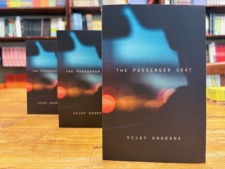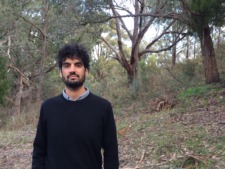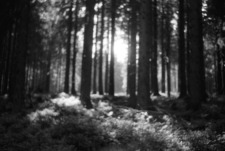The Bibliophile: On the Road
Want to get new excerpts, musings, and more from The Bibliophile right away? Sign up for our weekly online newsletter here!
***
Road trip narratives are often associated with freedom, independence, a desire to find something, or perhaps change something. They are filled with people hitting the open road, carefree, escaping their everyday lives in search of something greater.
One of my favourite aspects of Vijay Khurana’s The Passenger Seat is how it turns the cliched road trip story on its head. The novel follows two teenagers who want to get away from their small town for the summer. They are free from responsibilities and obligations, but soon realize they are trapped with each other in an enclosed space for miles. We feel their claustrophobia and the tension it brings. The games they play with each other as the road stretches endlessly in front of them become much darker as all that freedom and open space allows for their dissatisfaction with the world to grow.
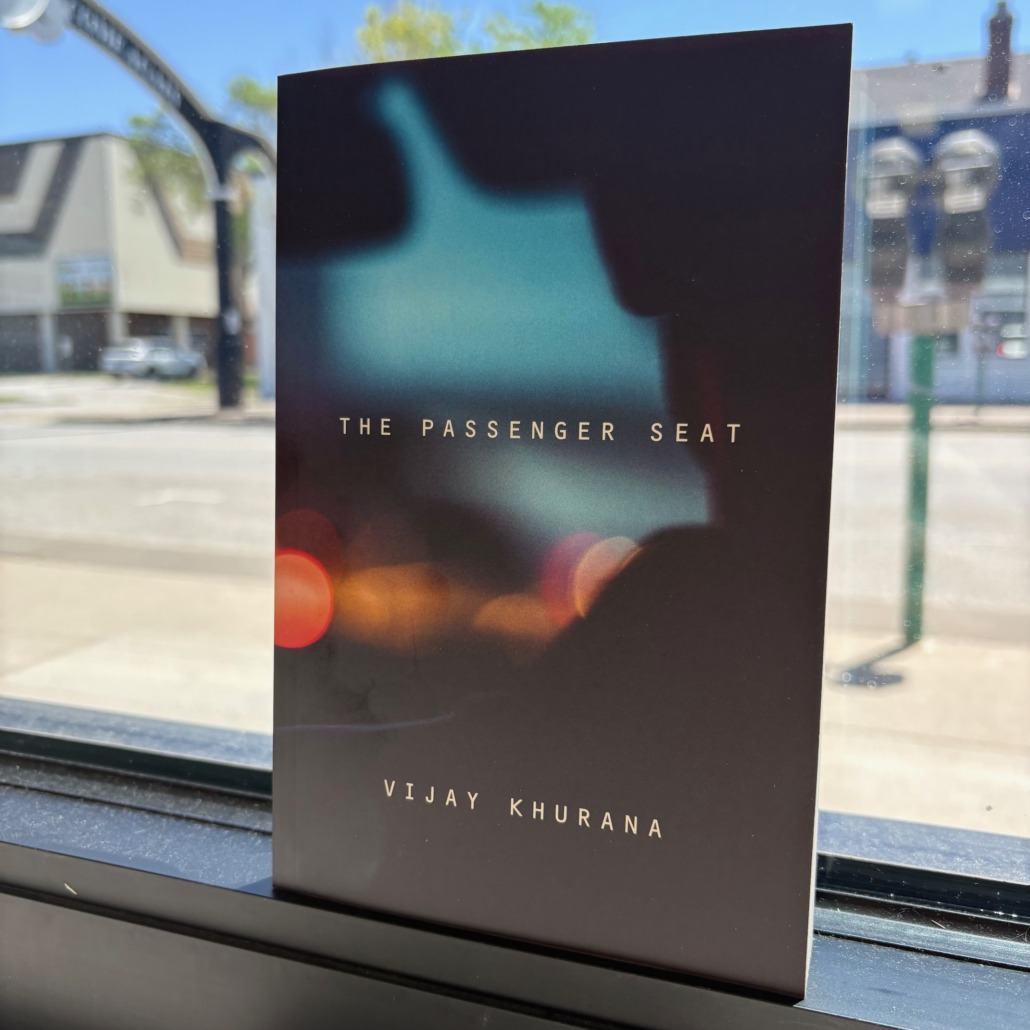
The Passenger Seat is a road novel for the atomized generation, the ones who’ve grown up in a world where, since everything can be a game, nothing needs to matter, including other’s lives.
John Warner, in his review for the Chicago Tribune last week, I think put it best when he said the novel feels “not so much written as conjured, as though the author has absorbed something from the larger ambient culture and distilled it into the characters and narrative. The result is like being put under a spell, an invitation to join some other mind in a shared dream.”
Vijay himself speaks about the paradoxes of the road trip and the novel much better than I ever could, and you can hear him do so in a recent radio interview with WPR’s BETA and on the podcasts Across the Pond and Beyond the Zero. Or if you’re like me and prefer print interviews, you can read this one from the Berliner.
But now as we head into the May long weekend, the unofficial kick-off to the summer, the time of year most of us start to think of getting back on the road, we thought we’d share with you an excerpt from The Passenger Seat.
Ahmed Abdalla,
Publicist
An Excerpt from The Passenger Seat
The road though! Endless becoming, a colour palette always and somehow never changing, grey to green to brown to blue to other, occasionally red, very occasionally yellow, whoosh, repeat, repeat, something comes the other way with headlights on, the beauty of headlights in daylight, fence, field, these lane markings like perforations maybe, as if the road or the whole world could unzip any moment now, if there were such a thing as a moment when you’re driving, which Teddy realizes there isn’t. It’s just one long stretch. The road and its contradictions: boredom and excitement, you sit still but you’re moving, there’s a good kind of silence even with the engine noise and the German metal Adam has them listening to. Teddy’s mom used to call this sitting and thinking time. But all Teddy wants to think about is how the world keeps rushing toward them then dropping harmlessly into their wake. Adam is a good driver. He speeds often, especially to pass the empty logging trucks that must be on their way back to tree farms farther north. Adam tells Teddy the German metal is political, but it’s in fucking German so how can Adam know? The singer’s definitely angry, though. Teddy can’t decide if Adam’s tastes are more adult or more childish than his own. Is what Teddy likes, let’s say Arkells, more grown-up or just more boring? Funny that people call things middle of the road. That’s where they are now, as Adam passes another rig and swings back in before the line of oncoming traffic can snag them. Somebody beeps, and Teddy lets out a hum to match. Wasn’t that a bit close, he thinks but doesn’t say. He thinks about rhythm and speed, about the fact that they don’t know where they’re going.
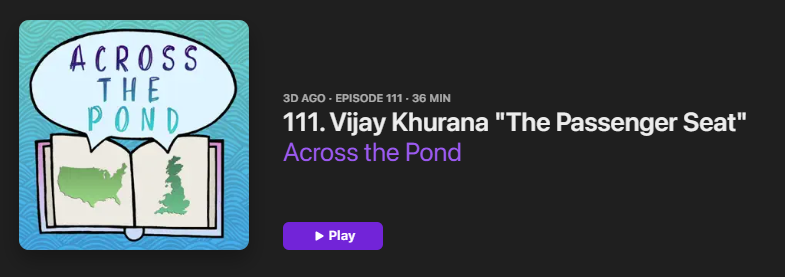
At a gas station they buy energy drinks and for an hour they talk eagerly over the music, looking for ways to express how free they feel. Then comes the crash, spiralling silences in which the music speaks for them and Teddy nearly falls asleep. Towns go by, billboards, fruit trees, fences. The images don’t stop when he closes his eyes, and when he opens them again he sees something amazing. Two horses are standing nose to nose in a field, perfectly still, like somebody glued them together. They look like statues or oversized toys. One of them is wearing a halter around its head, the other isn’t. Somehow this makes Teddy think of the French they had done at school, how pointless it was because no one could remember anything by the time the next class came around. The recap would take more than half the time, the teacher getting more and more frustrated. But what did she expect? To Adam he says, over the music, Do you remember when you asked that French teacher if the word for cat also meant pussy? Adam laughs, then says, Wait, are you sure that was me? I don’t remember that. It was absolutely you, Teddy says. They hadn’t been proper friends back then, but he remembers it, his green pencil case, how the boys all laughed and the girls groaned and the teacher just went on as though Adam hadn’t said anything. She was telling them about two words that sounded almost the same, and you had to be careful or you’d end up telling somebody about your horses. She was showing off, trying to make the class laugh, but Adam stole her thunder with the pussy comment. Thinking about it now, years later, Teddy decides that Adam’s comment was actually pretty smart. It was really about how pointless the whole situation was, how they were all wasting their time, the teacher included.
They’re going too fast to have the windows open and the truck’s AC is broken. You only need it two weeks of the year anyway, Adam jokes. But surely these will be those weeks. It’s late afternoon and the sun is still well above the trees. On a long, mild hill the truck seems to struggle until Adam drops a gear. Teddy feels sweat on his neck and in his little pocket of chest hair. Away to the right are miles of quiet forest, places where nobody ever goes, probably full of bugs and bears. He hates himself for not being able to drive.
Stopping is glorious, a chance to move and to fart and to breathe. They both balance on shin-high posts beside a trash can, performing a laughing parody of martial art, for no reason other than the joy of controlling their bodies, of coordinating, synchronizing. Slowly the game becomes a competition, who can jump one-legged from post to post without falling. Knowing their phones will eventually fail them, they buy a map and unfurl it on the truck’s hood, captain and first mate. They can go anywhere they want. Teddy plants a finger at the tiny pink words HOT SPRINGS, feeling the engine’s heat through the waxy paper. Adam steers them north and east, away from the coast where they spent their boyhoods. Inward, toward what comes next. As the sun finally hits the treetops, Teddy tears open a softened chocolate block and passes it to Adam by the row. It leaves sweet muck on their hands, and later, as he stares out the window into the dusk, Teddy realizes he is sucking his thumb. The more the light goes, the more it is his own face he sees in the glass, lit by the blue stereo glow, already a ghost.
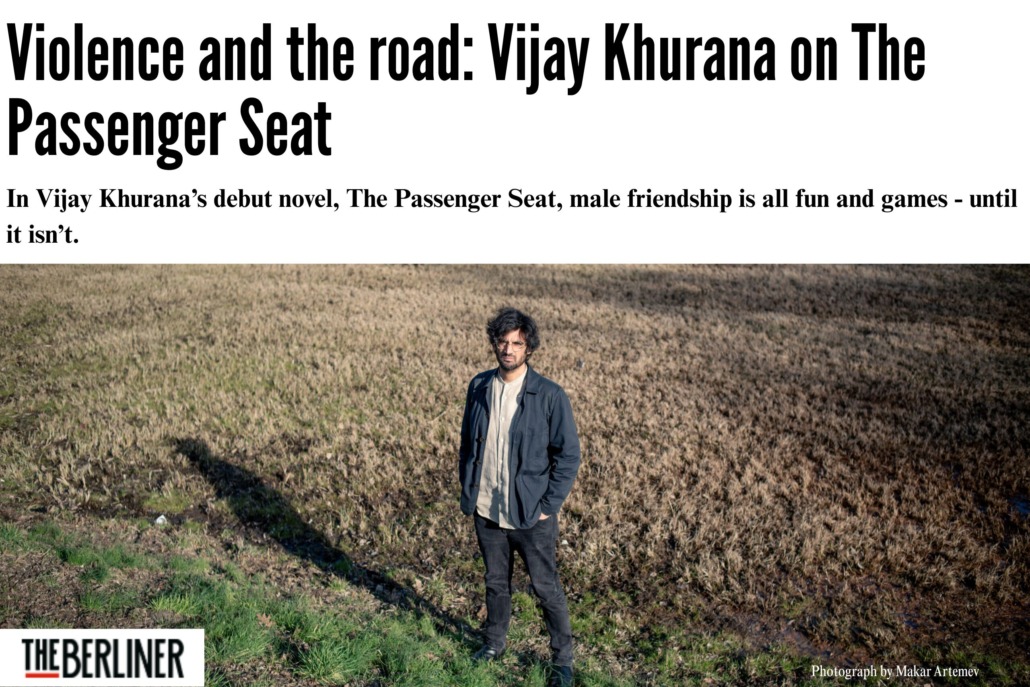
Each town they pass through is smaller than the last, recognizable brands slowing to a trickle. They stop for the night on the outskirts of one place, at a bend in the river that looks deserted enough. Adam says they’re far enough from the town that no one will bother them but close enough that they can walk back to that bar they passed. They’d probably get served in a town that small. He parks beside a low track that runs into a sea of pebbles and what looks like a ford through the black water. Teddy can imagine it flooding. Even with the driving done he remains a passenger, watching as Adam unfolds the tarpaulin and ties its ends to the truck’s raised trunk. There’s only one good tree, so Adam squats by the river and lets the water fill one of his new canisters. Then he lugs it back to use as an anchor. Teddy is impressed, and determined to make his own contributions. He doesn’t want to end up with the domestic jobs while Adam does the fun stuff, but with no other options he gets the camp stove out of its mesh sack and tries to remember how the pieces slot together. The burner hisses when he finally lights it, a memory of childhood, of hunger and the happiness of being somewhere other than home. This, he thinks, will be the summer his mother finally leaves his father and goes off with Ron; maybe he will arrive back to find everything dealt with, like how he avoids the kitchen until he knows the dishes are done. He hears the click of a bourbon bottle opening for the first time. Adam has scored three from his cousin, Teddy doesn’t know on what terms. Fuck, Teddy says. We don’t have a can opener. Yeah we do, Adam says, handing him his utility knife. Teddy repeatedly pushes its hook through the metal lid, making notch after notch until he has torn a jagged mouth. Probably he did it wrong, but Adam doesn’t say anything.
They sit with scalding cans between their knees, two mouths making plenty of noise. In brief moments of quiet Teddy hears other things, birds crying in the dark and the persistent river. They pass the bourbon back and forth, and Teddy is happy. He is part of a team. You think we can make it to the Arctic? asks Adam. You mean the ocean? Yeah, Adam says. Jesus, Teddy says, how far is that? Adam’s voice is defensive. It doesn’t take that long, maybe a week. A week there and a week back, Teddy says doubtfully. He doesn’t mention how much it would cost in gas because then Adam would try to buy half the rifle off him again, which would defeat the purpose of having it. Plus he wonders what happens if they get bored, have a fight, or just get sick of each other. He leans back and looks at the stars beyond the tarp, telling himself to relax and enjoy the ride. It’s a lot of driving to do on your own, he says eventually. Maybe, Adam says, not taking the bait. Adam suggests again that they walk to the bar, but this time it sounds more hypothetical. Both of them have taken root in their camping chairs, staring like old men at the darkness that must be the river. By the time the bourbon is a quarter gone, they’re both half-asleep. They lay their mats and sleeping bags side by side in what Adam calls the camper, a rigid bubble bolted to the rear part of the truck. When Teddy closes his eyes he sees the blue flame from the camp stove, then the blue light from the car stereo, then the horses. How weird they looked, how fake, but they were definitely real.
In good publicity news:
- Don Gillmor, author of On Oil, was interviewed in The Tyee. On Oil was also reviewed in the Miramichi Reader: “Well-researched . . . [and] warns us that should we keep worshipping at the Oil & Gas altar, our story won’t have a happy ending.”
- Catherine Khordoc, translator of Mélikah Abdelmoumen’s Baldwin, Styron, and Me, was featured in an article on translation on the Carleton website.
- A Way to Be Happy by Caroline Adderson was listed as one of CBC Books’ “14 Canadian short story collections to read for Short Story Month.”
- Near Distance by Hanna Stoltenberg (trans. Wendy H. Gabrielsen) was reviewed in On the Seawall: “Stoltenberg’s dual control of and surrender to the psyche of her novel most impressed me.”
- A Case of Matricide by Graeme Macrae Burnet was reviewed in the Winnipeg Free Press: “It’s depressing, intriguing and quite engrossing.”


